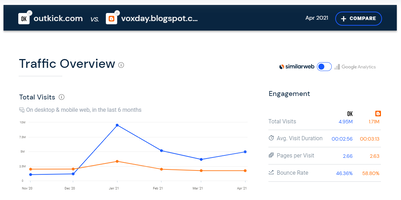Clay Travis celebrates being bought by the Murdoch Cube:
So how do you get kids, who have tremendous advantages you didn’t have, to work hard and compete in the future? That’s what I’m going to spend the next 10-15 years working on with my boys. And it’s a new concern that I’m grappling with right now.
But after we signed the papers to sell OutKick, I turned to my wife and told her there would never be any kids, grandkids or great-grandkids who had to worry about money during our lifetimes. (They all may blow it after we die.) And that was a pretty incredible moment to have as parents, and hopefully future grandparents and great-grandparents too.
I also told my wife that since she’s going to live to be over 100 years old and I think I’m probably going to die around 51 years old from working too much that she’s going to be a really rich widow for a long time.
On the one hand, you can’t fault an entrepreneur for living the dream. Selling out is the original objective for most startups. On the other hand, if you’re preaching about the importance of independent media, being your own boss, and the evils of the corrupt mainstream media, then how on Earth can you justify selling out to the very people responsible for the problem in the first place? It’s not merely hypocritical, it’s outright wrong.
Anyhow, I thought this graphic below was an interesting comparison. Note that SimilarWeb seriously underestimates VP’s pageviews – which according to Google were over 8 million in January – but I assume it does the same for everyone, so it’s the relative aspect that matters. Fortunately, no media company is interesting in acquiring VP and I have absolutely no interest in taking any tickets. Among other things, I know how fast what appears to be “generational money” can vanish, even during the founder’s lifetime. You may be able to outkick the coverage, but once you take it, you can’t outkick the ticket.
Clay and our third partner, Sam Savage, misrepresented the business of OutKick. Both Clay and Sam told me directly (and my lawyer in writing) that Sam’s equity stake in OutKick was contingent on Sam investing $500,000. Shortly after I arrived at OutKick, my lawyer was told that things were going so well financially that Sam no longer needed to invest $500,000 to get an equity stake in OutKick.I objected. I confronted Clay and Sam about it. Clay said that he didn’t want to waste time or energy pursuing Sam’s investment.I found this preposterous and baffling. My equity in OutKick was based on “sweat.” I believe my “sweat” is far more valuable than Sam’s. Sam, of course, disagreed. He told me that my arrival at OutKick was a “kick in the nuts” and that all three of us should own one-third of OutKick.Sam refused to pay the $500,000 and his consulting firm, Savage Ventures, charged OutKick $42,000 a month for work that I deemed amateur. In my view, Sam Savage, the person with the smallest stake in OutKick and the least amount of value, exercised the most control over the company.
Given with whom he partnered, it’s clear that Travis was always looking to sell Outkick despite his nonstop talk about the importance of independence. I doubt he was ever anything more than a pedestrian financial grifter looking for the big strike. Whitlock did well to get out when he did. What profit it a man and all that.
